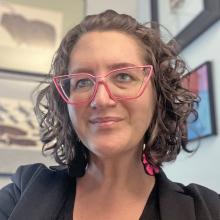What interested you in becoming a developmental scientist?
I grew up in a family where community engagement and activism were key pieces of our collective identity. As a child, I would join my parents and other family members in community service and activism, simply viewing this as what our family did. Later on, this developed into my own self-driven service and activism. At the same time, I grew increasingly aware of the bias-based motivation behind victimization and othering that marked my experience as a “scholarship kid” (from a single-parent working class household with an interfaith family background), coming to understand their queer identity, attending a Jewish day school—where we experienced religious slurs to bomb threats. Throughout much of my adolescence and emerging adulthood I reflected on these formative developmental experiences to better understand what individual and societal structures define our intergroup reasoning and behaviors and how do these first develop and then shift across our childhood, adolescence, and early adulthood. The why we navigate (competing) drives for autonomy and attachment, for individual and collective identity, for acceptance within and resistance to our social systems and how that plays out in our lived social worlds fascinates me. How can we nurture justice, openness, and compassion that we see in young children and empower youth to be agents of change? Why and how do we continue to perpetuate systems of inequity and oppression that become more polarizing with age? When I was exploring my professional identity in college, I first planned to be an art therapist; I spent a lot of time thinking not just about art therapy but also about the arts as a means of communicating and enacting societal norms regarding inter and intragroup dynamics, social hierarchy, and inequity. The arts are also a vibrant site of resistance! During that time, I thought my interest in studying discrimination, victimization, and inequity and my related activism existed purely within my personal life. A dear friend posed a simple question and asked if I could pursue a career as a scholar-activist. I have never looked back.
Who inspires you?
The past and future generations of my family. I am grateful for and inspired by generations of determined family members, especially a lot of strong women, who work tirelessly against religious, political, and racial persecution and who showed me that we can disrupt social injustices. I’m also inspired by the next generation—my wonderful stepson and all of my grown and young siblings. One of the greatest gifts I’ve received is the ability to be a significant part of their lives - as a tante, tata or an auntie - and be present as they approach this world with compassion, care, and curiosity. I am especially inspired when the innocence of youth is expressed in earnest questioning of the status quo. They each remind me why it is critical to listen to our youth, trust them to guide us, and amplify their voices.
What words of wisdom might you pass on to someone on their very first day after deciding to get a Ph.D. in developmental science or related field?
It is important to remember that our professional identities—or components thereof—continue to develop just as do our social, emotional, cognitive, and physical qualities. Allow yourself to continue to grow and stretch and don’t view that winding path as a lack of confidence or commitment; instead recognize that there are times when we are pulled in unexpected directions or need to reevaluate the alignment of our professional and personal values. Finally, find a social network of peers and mentors who want you to succeed in ways that are meaningful to you. You get to define what success looks like in your life.
What’s your favorite aspect of SRCD membership?
I truly enjoy the small communities I’ve found within this large organization. Through the caucuses we can be supported and support others who have been and continue to be marginalized in our society and our profession. Through the Anti-racism in Developmental Science Summit, we built bridges between scholarship, policy, and practice to use our science and partnerships for the betterment of our field and society. Drs. Emilie Smith and Velma McBride Murry were phenomenal organizers! We have the opportunity to find mentors, collaborators, and friends.
Why did you join the SOGIE Caucus and how does it facilitate connection among members all year long?
I was grateful when SOGIE leaders founded the SOGIE Caucus. I think there has always been an informal network of SOGIE scholars who have supported one another, but the Caucus has allowed so many more folks to access and benefit from this great community. It helps us all to stave off the feelings of isolation and underrepresentation and is a dedicated space for celebrating our identities, scholarship about our communities, and queer joy.
